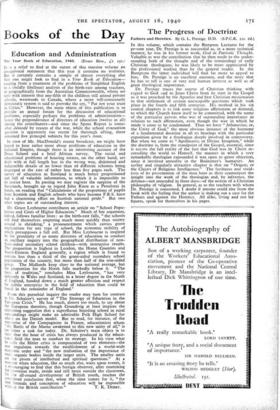Books of the Day
Education and Administration
The Year Book of Education, 1940. (Evans Bros., Li iss.) IT is a relief to find at the outset of this massive volume an unequivocal statement that this year it contains no statistics. But it certainly contains a sample of almost everything else that one might look to find in a Year Book of Education— ranging from a treatment of the problems of Simplified English to a (mildly libellous) analysis of the birth-rate among teachers, or geographically from the Australian Commonwealth; where we note with interest that one-fifth of the children still attend private schools, westwards to Canada, where a more self-consciously democratic system is said to provoke the cry, " Put not your trust in Civics." However, the main object of this publication is to provide an annual forum for the discussion of educational problems, especially perhaps the problems of administration— hence the preponderance of directors of education (twelve in all) among the contributors—and since the Spens Report is some- what demode by reason of the war, while the school evacuation question is apparently too recent for thorough sifting, there remained five principal subjects for this year's issue.
In view of Mr. MacDonald's recent broadcast, we might have hoped to hear rather more about problems of education in the Colonial Empire, though there is an interesting account of the Doon School and a brief African survey. The social and educational problems of housing estates, on the other hand, are dealt with at full length but in the wrong way, disjointed and indigestible details of no fewer than r6 different schemes being disgorged at the rate of rather less than five pages each. The survey of education in Scotland is much better proportioned and full of valuable information, to which it is impossible to do justice here. In passing we may register the surprise of the Sassenach, brought up to regard John Knox as a Pestalozzi in bands, on reading that " Calculations of the proportions of pupils from Scottish and English schools who have become F.R.S. have had a chastening effect on Scottish national pride." But two other topics are of outstanding interest.
Dr. Grace Leybourne contributes an article on " School Popu- lations and Costs of Higher Education." Much of her argument, indeed, follows familiar lines: as the birth-rate falls, " the schools will find themselves emptying much more quickly than society around is shrinking," a pronouncement which carries grave implications for any type of school, the economic stability of which presupposes a full roll. But Miss Leybourne is inspired by the proximity of so many directors of education to conduct an ancillary inquiry into the geographical distribution of non- State-aided secondary school children—with instructive results. The proportion is highest in London, the Home Counties and South-Eastern England generally, a region which is found to contain less than a third of the grant-aided secondary school population of the country, but more than half of the non-aided group. The Midlands keep close to the national average, but the proportion for the North falls markedly below it. "The force of tradition," concludes Miss Leybourne, " has very definitely in Wales and Scotland, to a lesser degree in the North of England, handed down a much greater affection and respect for public enterprise in the field of education than could be found in the remainder of England."
From this parochial inquiry the reader may turn for contrast to Dr. Schairer's survey of " The Strategy of Education in the European Crisis." He has much, almost too much, to say about the European theorists, though Grundtvig at least inspires the interesting suggestion that a superfluous boarding school in rural. surroundings might make an admirable Folk High School for adults on the Danish model. But to read, for instance, of the enterprise of the Compagnons in France, educationists whom the Battle of the Marne awakened to this new unity of all," is too bitter a task for today. Dr. Schairer's main object is to show that the hour of crisis has always produced in the educa- tional field the man to conduct its strategy. In his view what he calls the Hitler crisis is compounded of two elements—the new impulsion towards the establishment of a world-wide economic order and "the new realisation of the importance of small organic bodies inside the larger units. The smaller units are the pivots of intellectual and spiritual questions." At a moment when education, like so much else, waits upon events, it is encouraging to find that this foreign observer, after examining the provision made, inside and still more outside the classroom, for the all-round development of British youth, reaches the Considered conclusion that, when the time comes for it, "the new formula and conception of education will be impossible


























 Previous page
Previous page